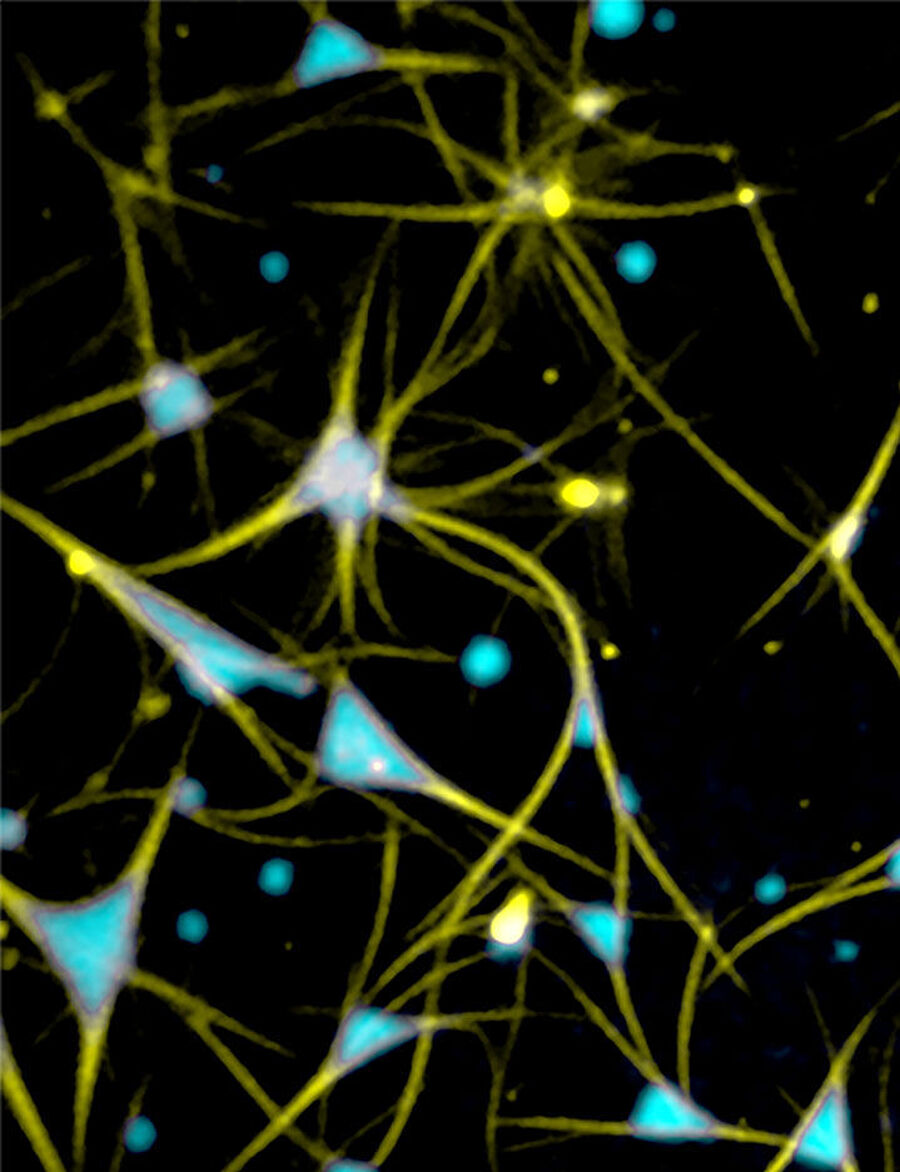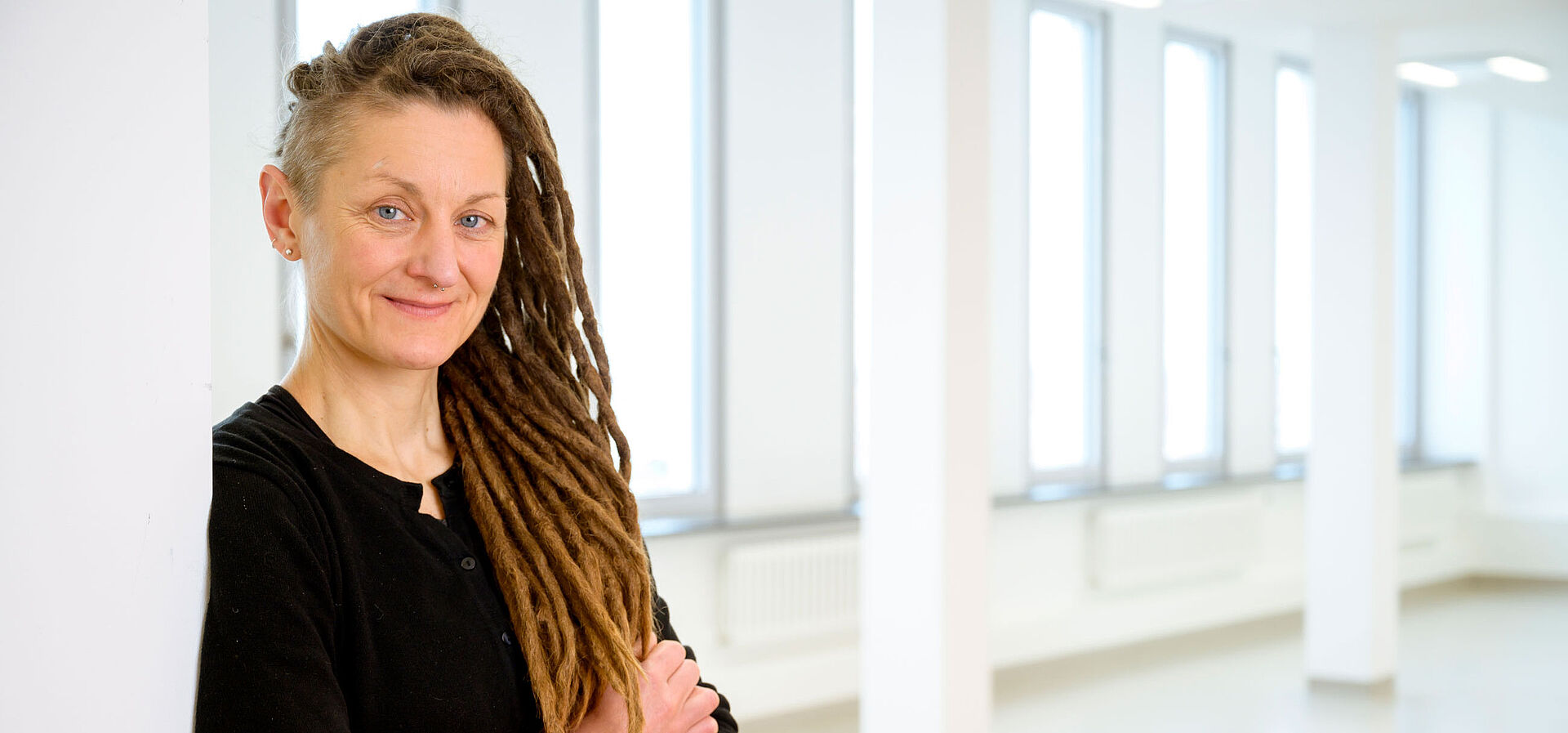From passion for tinkering to world-class science
Tau researcher Susanne Wegmann to receive the Rainwater Prize for Innovative Early-Career Scientists. A portrait.
DZNE researcher Susanne Wegmann wants to decode the protein tau - the substance that plays a key role in Alzheimer's disease. The young biophysicist is already one of the most renowned experts in this field.
It was at 7 o'clock one morning when Susanne Wegmann saw a human brain for the first time, she remembers it well. "I was currently a post-doctoral fellow at Massachusetts General Hospital in Boston, and they held a neuropathology colloquium once a week," she recalls. Wegmann was already on the trail of the mysteries of tau proteins in Alzheimer's dementia at the time, but she was mostly concerned with the intricacies of the proteins rather than the brain as a whole. "The event was led by a renowned neurologist, and after a brief introduction, we went into the anatomy room and he showed us the traces that neurodegeneration leaves in the human brain."
That was a key moment in Susanne Wegmann's career: She saw with her own eyes the devastation her little proteins can wreak. Today, Wegmann is one of the renowned researchers in the field of tau protein and associated dementias: It was just announced that she will receive the Rainwater Prize for Innovative Early-Career Scientists - with its $200,000 prize money, it is one of the most prestigious awards in the field of tau protein brain research. Since 2018, Susanne Wegmann has been back in Germany after working in Switzerland and the USA: at the Berlin site of the German Center for Neurodegenerative Diseases (DZNE), she heads a research group on "Protein Processes in Neurodegeneration". And on the side, she is committed to promoting equal opportunities in science, among others at the Alexander von Humboldt Foundation.
Her path to research actually began out of a hobby: Even in her school days, Susanne Wegmann liked to tinker, she built for example rafts for long trips on the water and spent as much time outdoors in nature as she - "I'm a real West Berlin girl!" - in the confines of the big city. And when she was looking for ways to turn tinkering into a career, she discovered studying biotechnology. "You tinker with organisms and change them or look at proteins - at least that's what I thought at the time," she says, laughing briefly at the memory, because she had no idea that she would then at the Technical University of Berlin also have to grapple with the theorems of thermodynamics or spend an entire semester studying flow properties in tubes. But whenever she could, she would sink her teeth into the intricacies of proteins - those proteins that act as signaling agents or transporters, but can do so much damage if misdirected.
Our special approach lies in interdisciplinarity. There aren't many that look at the bigger picture, from molecular structure to the human brain.
With her Berlin research group, she is focusing on the protein tau. In Alzheimer's patients, deposits of tau accumulate in nerve cells, and Wegmann is investigating why this is so - and how exactly the protein affects elementary cellular processes. "You can think of it as tau really shutting down the cells," she says: All modes of function of the affected cells - from transcription and gene regulation to the transport of messenger substances into the cell nucleus - are affected by tau, often distorting or stopping them altogether. "New publications appear every day in the field of tau research, and quite a few research groups around the world are working on it," says Susanne Wegmann. In order not to get swept up in this race, she looks for niches. "Our special approach lies in interdisciplinarity," she says, explaining the success of her research group: "There aren't many that look at the bigger picture, from molecular structure to the human brain."

She spent six years in the U.S., and that phase continues to shape her research today. Even during her doctoral studies in Dresden and Zurich, she worked on proteins and their folding. "At that time, I didn't care what kind of protein I was looking at now," she recalls - but then she met Eckhard Mandelkow as a mentor, one of the leading researchers in the field of the tau protein and active at the DZNE until his retirement. "Since then," she says, laughing, "I have dedicated my soul to tau." In the U.S., after completing her doctorate, she started working in the lab of Bradley Hyman in Boston - he, too, a figurehead in brain research. "Everyone else in the group was a neurologist or pathologist, it was just me who had never seen a brain before." And so Susanne Wegmann sat at the table during the meetings and first had to orient herself to the topic. "When they talked about some formations in the hippocampus, I always thought of hippos," she says coquettishly, shaking her head. She quickly understood that the hippocampus is an essential part of the brain - and anyway, she had probably never read and learned as much in her life as she did during that phase in the U.S., in order to quickly catch up. "The reason they had brought me into the group was because I had a more unbiased view of the subject. With their knowledge of the brain and my background in protein structure, we were able to come up with great ideas together."
This outside perspective contributes to the fact that Susanne Wegmann only shrugs her shoulders to one of the oldest controversies in Alzheimer's research: Is it tau or amyloid - another protein that clumps together in patients' brains - that plays the essential role in the development of Alzheimer's? Two schools of thought have been at odds in research for decades, but Wegmann has joined neither. "Everything that goes on in the brain is important to the disease, otherwise it probably wouldn't happen," she says: "It's now pretty well accepted that amyloid is the trigger and tau is the executive hangman, so to speak." In order to reach the goal and develop a therapy for Alzheimer's disease, she says, it is necessary to understand both tau and amyloid - and she is concentrating on everything that has to do with tau.
Susanne Wegmann has deliberately made her research group international. She has just taken on a postdoctoral Brazilian for six months as a visiting scientist, and a Mexican has joined her as a postdoc. She also works on the Central and South American region for the Humboldt Foundation: as a Henriette Herz Scout, she is to discover promising talents. "The problem in this and other regions is that there are hardly any opportunities for future scientists. The countries provide a very good school education and also have very talented people at the universities, but these people are completely cut off by the post-doc phase at the latest. There are simply no jobs and no career prospects." She has wanted to help open up such prospects ever since she first became aware of the problems through her Mexican friend - this friend is now Susanne Wegmann's wife, and together they maintain close contacts in Central and South America.
And there is another issue close to her heart: she is committed to balanced publication practices in science. With the EMBO Journal, she is working on ideas for making the processes for selecting contributions more transparent. How often and how prominently researchers are able to place their work in such journals is a decisive factor in their careers - and in order to remove obstacles for women or researchers from non-Western countries, Susanne Wegmann is thinking about new evaluation procedures.
Meanwhile, the time has not yet come for her grand plan. "I would like to found an NGO together with my wife to tackle precisely these problems," she says. At the moment, however, there is so much to do in her own research that she doesn't get around to it. "But I haven't given up on the idea," Susanne Wegmann then says: "Just postponed it for the time being."
She fears that the topic anyway will be around for some time to come.

